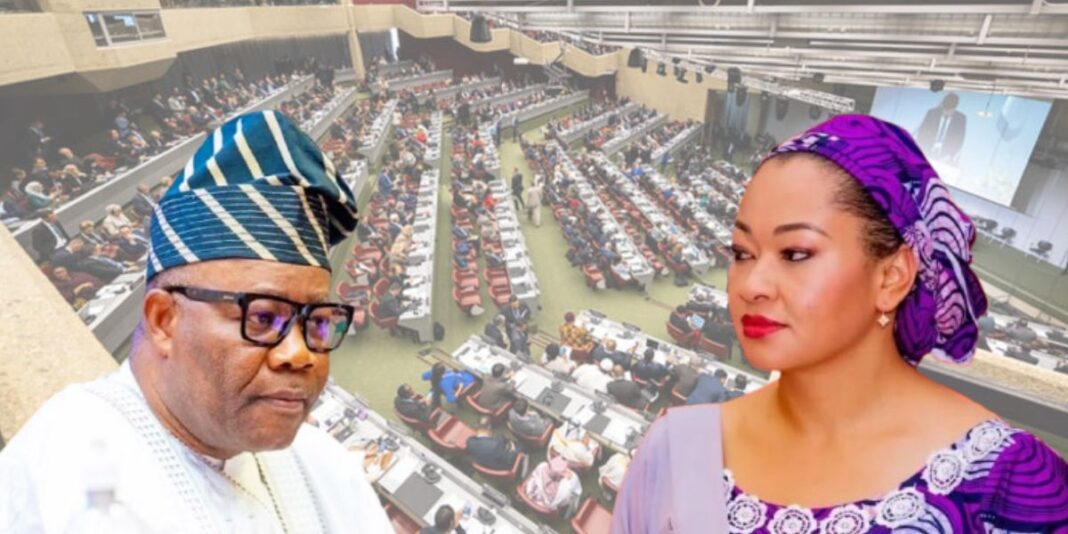The controversy surrounding Senator Natasha Akpoti-Uduaghan’s allegations against Senate President Godswill Akpabio and her subsequent suspension has now gained international attention, as the suspended lawmaker has taken her case to the Inter-Parliamentary Union (IPU).
Natasha Takes Her Case to the IPU
On March 11, 2025, Senator Natasha presented her case at the Women in Parliament session during the IPU meeting at the United Nations (UN) in New York. She appealed for justice, arguing that her suspension from the Nigerian Senate was illegal and politically motivated. She also expressed concerns for her security, alleging that powerful figures in Nigeria might attempt to detain her in New York for speaking out on the issue.


How Did the Dispute Begin?
The tensions between Natasha and Akpabio became public on February 20, 2025, during a disagreement over seating arrangements in the Senate. On February 28, she told Arise TV that this dispute was just one example of a broader pattern of mistreatment. She likened her experience to a university student being unfairly failed for rejecting a lecturer’s advances.
According to Natasha, her troubles began on December 8, 2024, when she and her husband visited Akpabio’s residence in Akwa Ibom. She alleged that Akpabio made inappropriate advances toward her, prompting her husband to warn her against visiting him alone in the future.
Legal Actions and Allegations
Natasha has since filed a defamation lawsuit against Akpabio and his aide, Mfon Patrick, seeking N100 billion in damages and N300 million in litigation costs. The suit was triggered by a Facebook post allegedly made by Patrick following a heated Senate argument.
She also alleged that she had been harassed and sidelined within the Senate, stripped of privileges, and excluded from international events to which she was originally nominated.
Akpabio Denies the Allegations
Senate President Akpabio has denied all allegations of sexual harassment. Speaking during a Senate plenary on March 5, 2025, he stated, “At no time did I ever harass any woman. I was raised very well by my late single mother, and I have always upheld respect for women. I was even awarded the most gender-friendly governor in Nigeria.”


Senate’s Disciplinary Actions
The Senate referred Natasha’s conduct to its Committee on Ethics, Privileges, and Public Petitions for investigation. However, she refused to appear before the committee, citing a court injunction against the Senate’s disciplinary action.
On March 5, the Senate suspended Natasha for six months following recommendations from the Ethics Committee. As a result, her salary and security details were withdrawn, her office was locked, and her legislative aides’ salaries were suspended. The Senate stated that she could only be reinstated if she issued a formal apology.
https://x.com/Imranmuhdz/status/1899740871169396936
Was Natasha Suspended for Her Allegations Against Akpabio?
The Senate has denied that her suspension was linked to her allegations against Akpabio. In a statement issued on March 8, Senate Leader Opeyemi Bamidele clarified that she was suspended for misconduct and indiscipline, not for speaking out against the Senate President.

IPU’s Response to Natasha’s Case
On March 11, Natasha formally reported Akpabio to the IPU, seeking international intervention. She described her suspension as politically motivated and part of a broader issue of gender discrimination in Nigerian politics.
In response, IPU President Tulia Ackson stated that the organization would ensure due process by hearing both sides before taking any action.
What is the IPU, and How Can It Intervene?
The Inter-Parliamentary Union (IPU) is a global organization that fosters dialogue between national parliaments to promote democracy, human rights, and peace. Established in 1889, the IPU aims to resolve international disputes through peaceful arbitration.
The IPU has the authority to intervene in parliamentary disputes worldwide, offering mediation and advocating for fair treatment of lawmakers. The organization aligns with the United Nations’ principles of justice and human rights, ensuring that women in politics are not unfairly targeted or silenced.
Nigerian Senate’s Response to the IPU
On March 12, 2025, the Nigerian Senate defended its actions before the IPU, reiterating that Natasha’s suspension was due to misconduct, not her harassment allegations. House Committee Chairperson Kafilat Ogbara, representing the Nigerian Parliament, called for a fair and unbiased investigation into the matter while reaffirming Nigeria’s commitment to women’s rights and gender equality.
She emphasized that while sexual harassment allegations must be taken seriously, due process must be followed to ensure justice for all parties involved.
What’s Next?
The IPU’s next steps will depend on its investigation into the matter. If the organization determines that Natasha’s suspension was unjust, it may pressure the Nigerian government to reinstate her and implement reforms to prevent gender-based discrimination in politics.
As this case unfolds, it highlights the broader challenges facing female politicians in Nigeria and the role of international organizations like the IPU in promoting accountability and justice within national legislatures.




